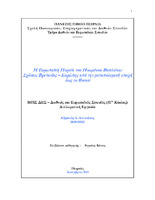Η ευρωπαϊκή πορεία του Ηνωμένου Βασιλείου: σχέσεις Βρετανίας - Ευρώπης από την μεταπολεμική εποχή έως το Brexit
United Kingdom’s european trail: British-European relations from the post-war era to Brexit

View/
Keywords
Brexit ; Ευρωπαϊκή Ένωση ; Ηνωμένο Βασίλειο ; Βρετανία ; Μεγάλη Βρετανία ; Αγγλία ; Σκωτία ; Ουαλία ; Βόρεια Ιρλανδία ; Σχέσεις Βρετανίας - Ευρώπης ; Ηνωμένο Βασίλειο και Ευρώπη ; Ευρωπαϊκή Οικονομική ΚοινότηταAbstract
The present dissertation treats the topic of the political history of the United Kingdom after World War II, and in particular the socio-commercial, political and economic relations of the country with Europe and the European Union, relations which went through all kinds of stages, complaint, conflict, coexistence, and ultimately the shocking withdrawal from the Union, accompanied by various reactions. Historical milestones are referenced, such as the Bretton Woods Conference and the Stockholm Convention, which led to the creation of the European Free Trade Association (EFTA), then the Treaty of Paris and the Treaties of Rome, the Treaty of Maastricht, the Treaty of Lisbon, and finally the much-discussed "Brexit", as well as the conclusion of the "AUKUS" agreement. The political moves of the country's leaders who have been involved in or contributed to the creation of Europe's common economic and trade path with the European Coal-Steel Community are also analyzed, from Edward Heath and Margaret Thatcher, to John Major, Tony Blair and Gordon Brown, to David Cameron, Theresa May, and Boris Johnson, leaders who were different but still quite similar in their beliefs, who nevertheless maintained the United Kingdom's relations with the rest of the world (e.g. the Commonwealth States), each through a series of decisions, mainly with emphasis on bilateral agreements, trade, economy, and even military decisions, in order to keep the country in the position of the "superpower" that existed before World War II, despite the final rupture in the relationship between the United Kingdom and the European Union, and despite the rejection of the vision of the general "superstate". All these elements will outline the profile of the "awkward partner" all along, and the general mentality of the country that determined the beginning and the end of its "European trail".


